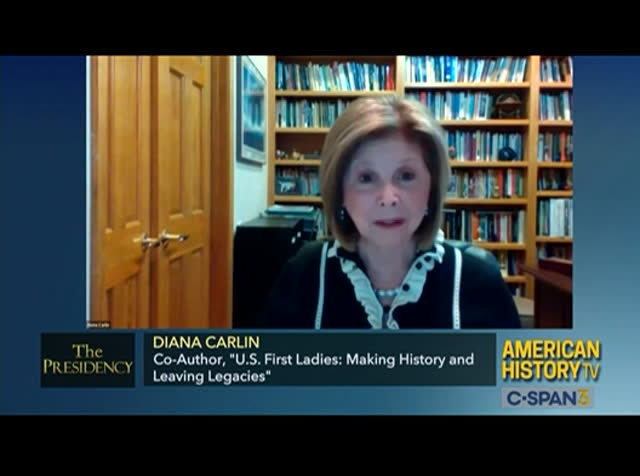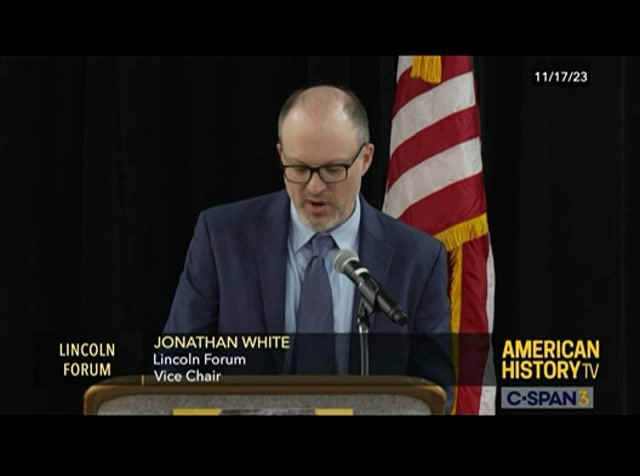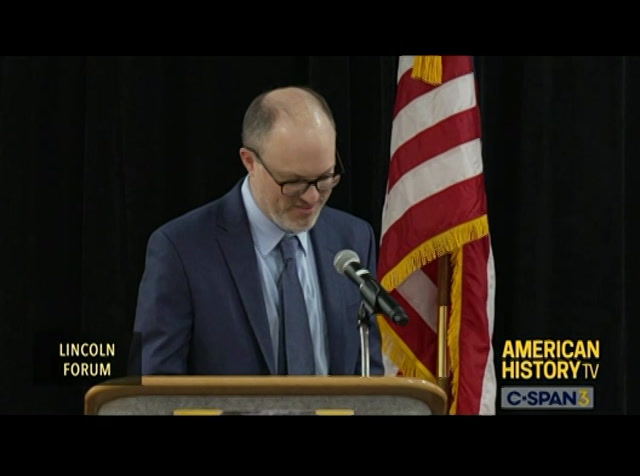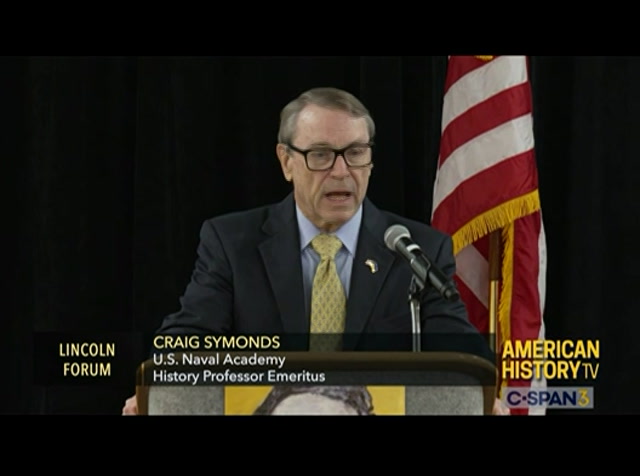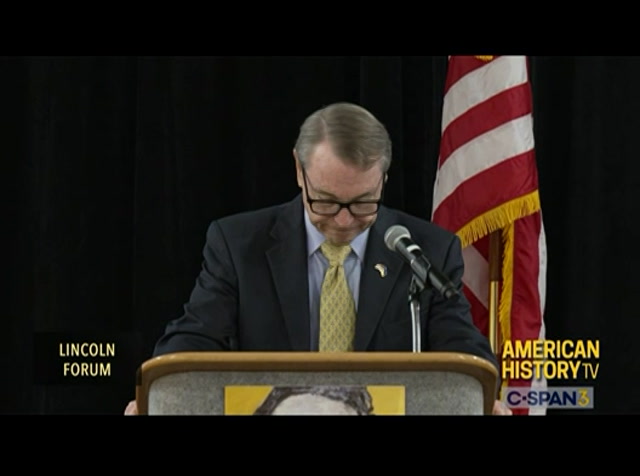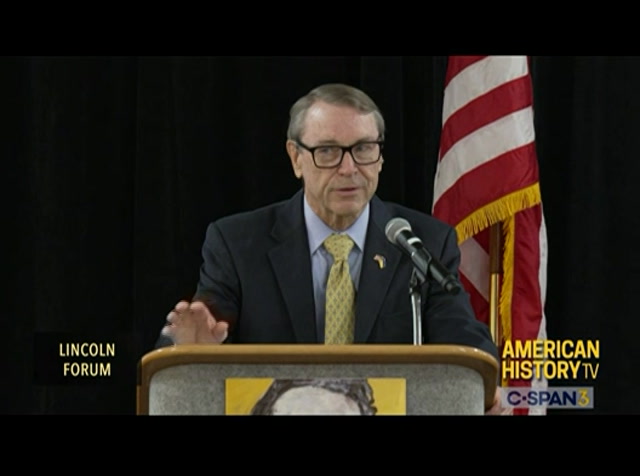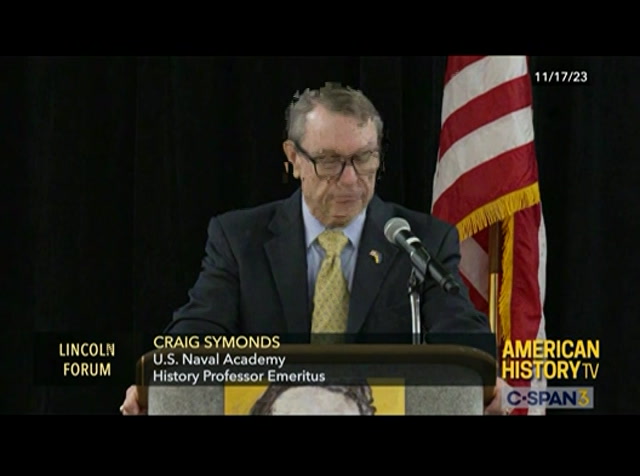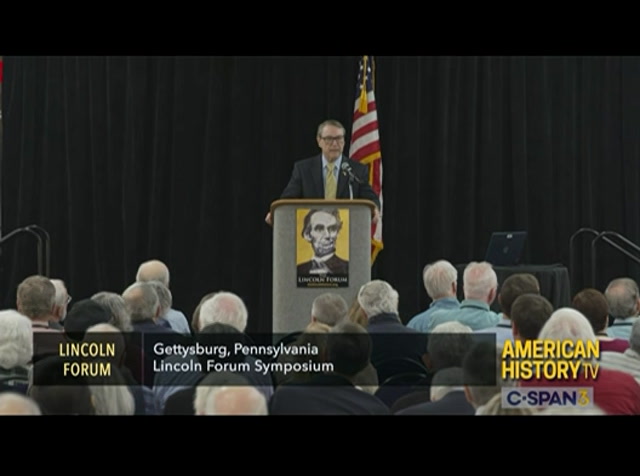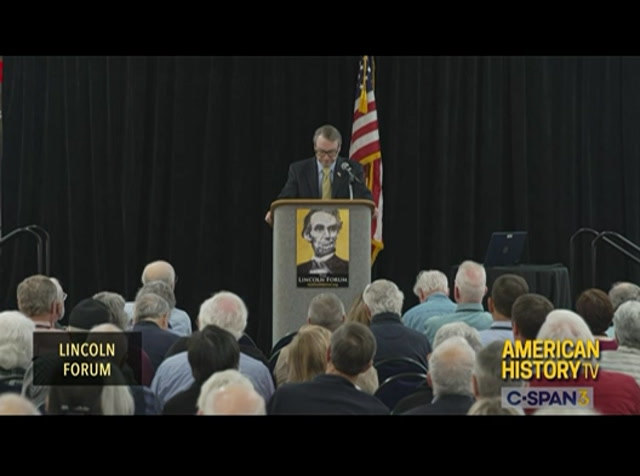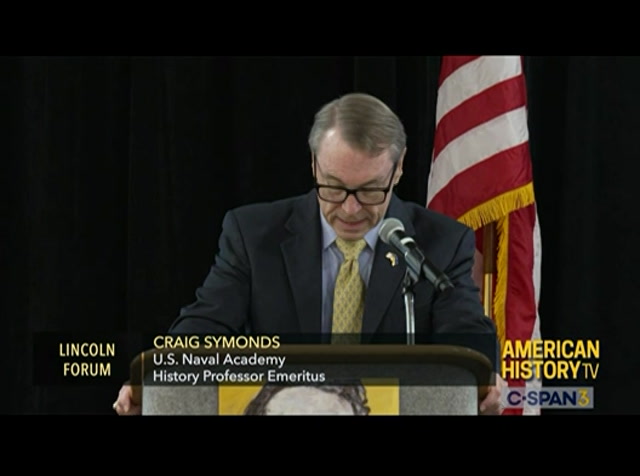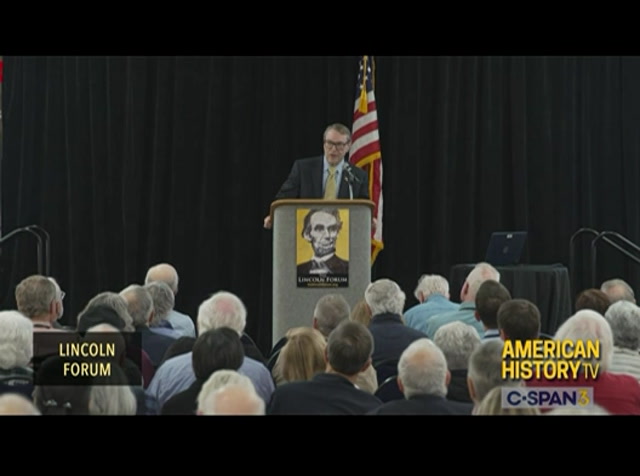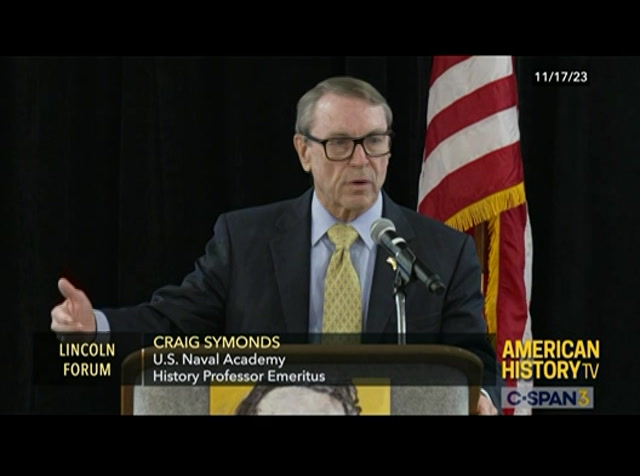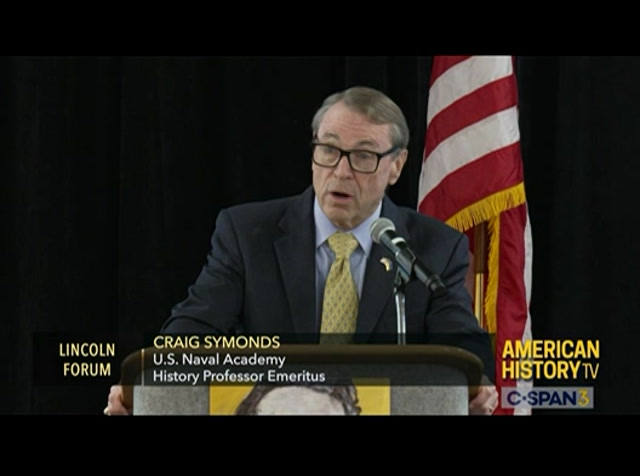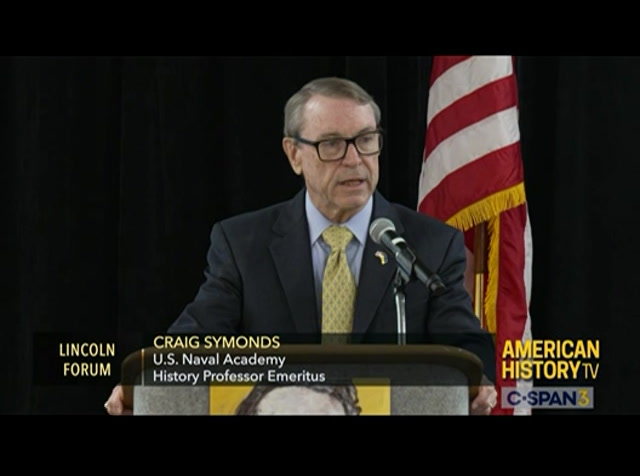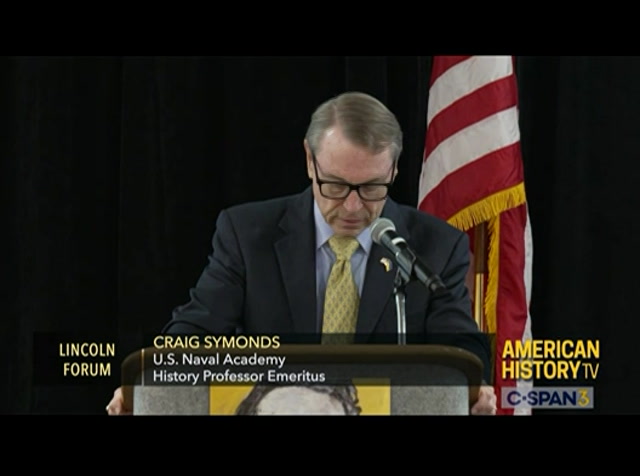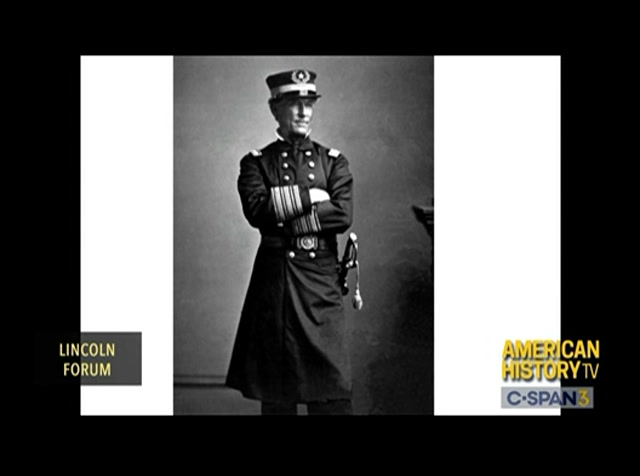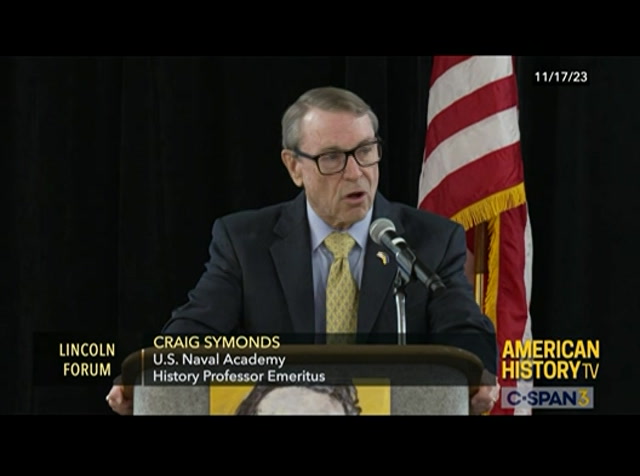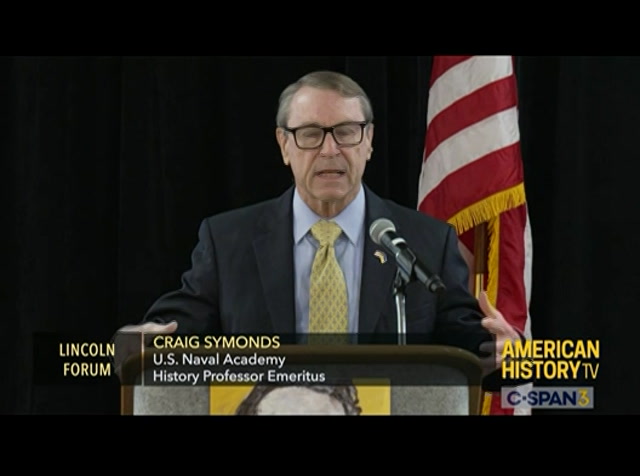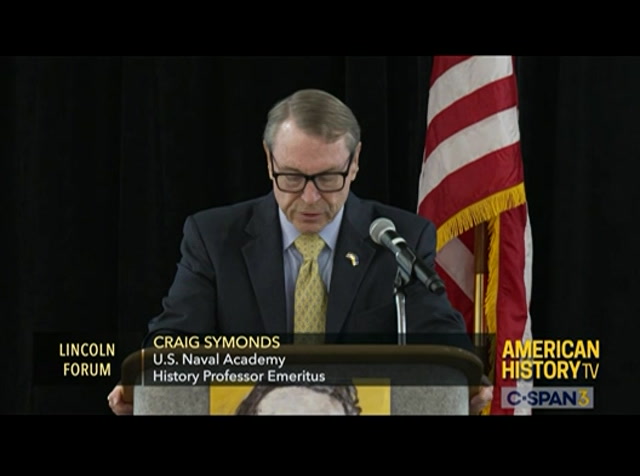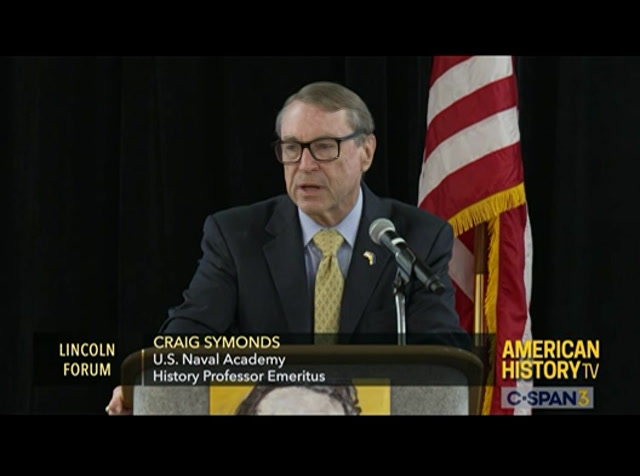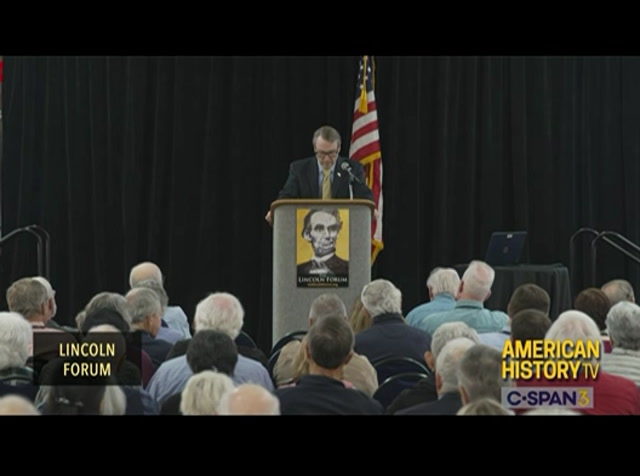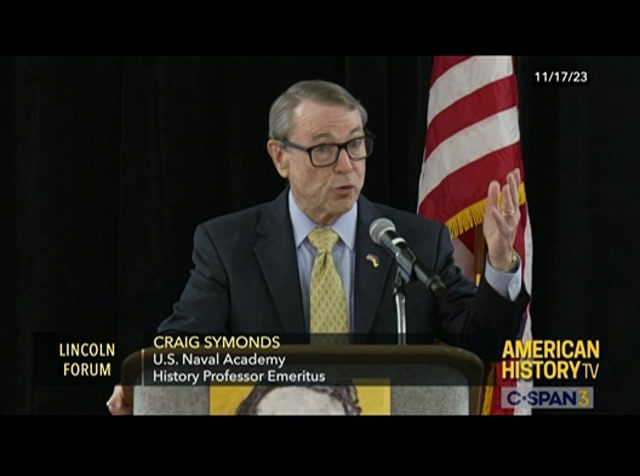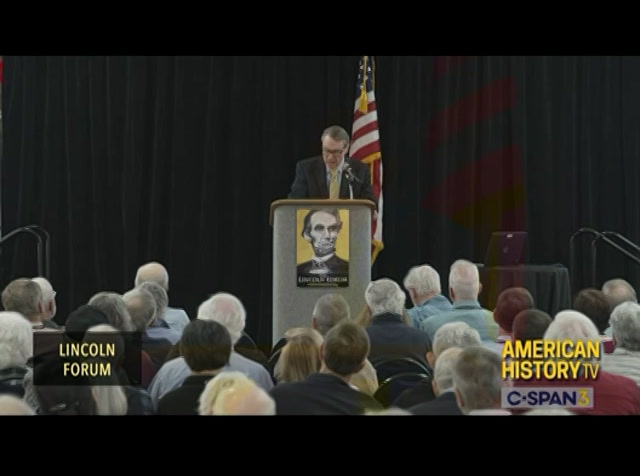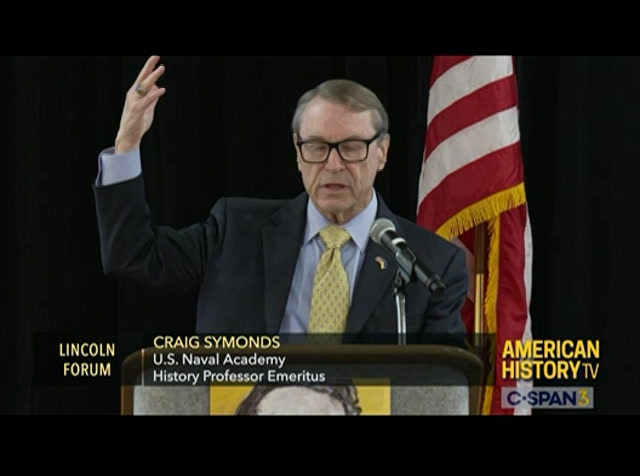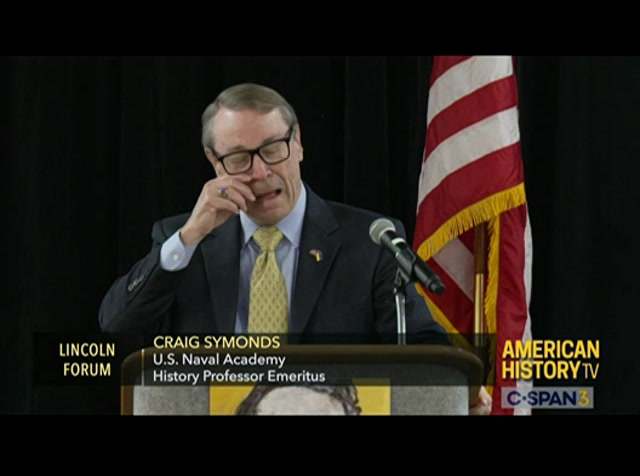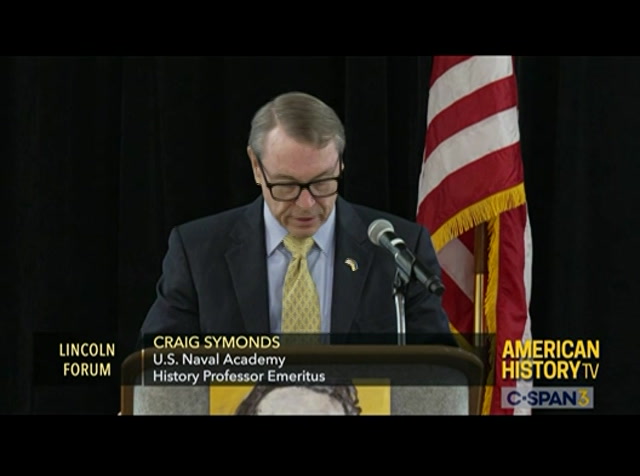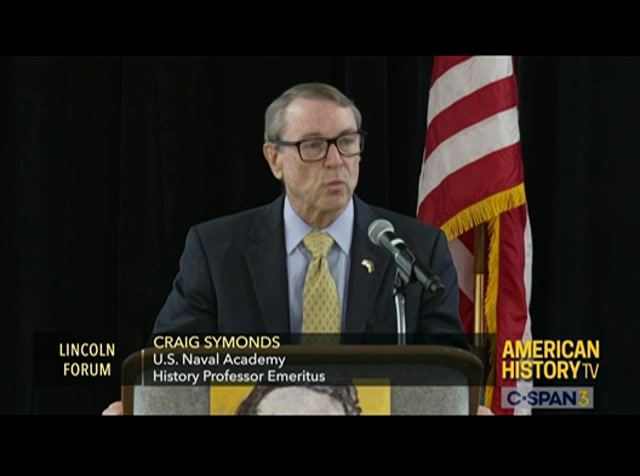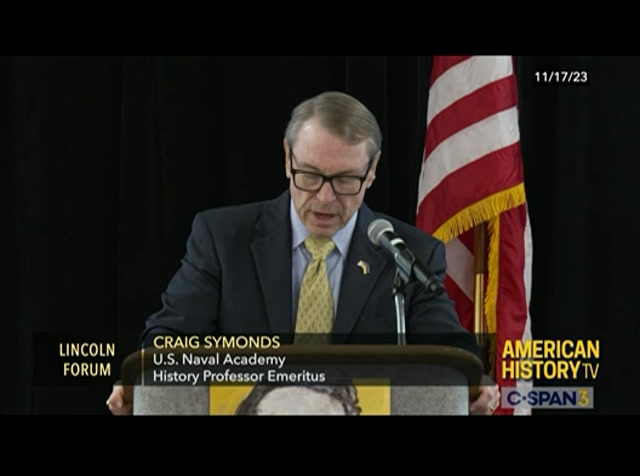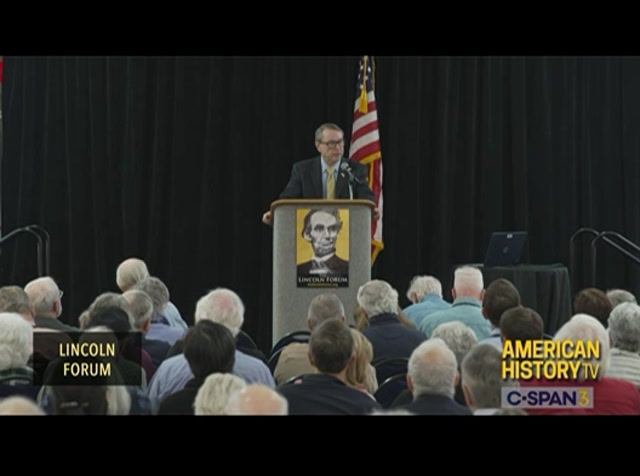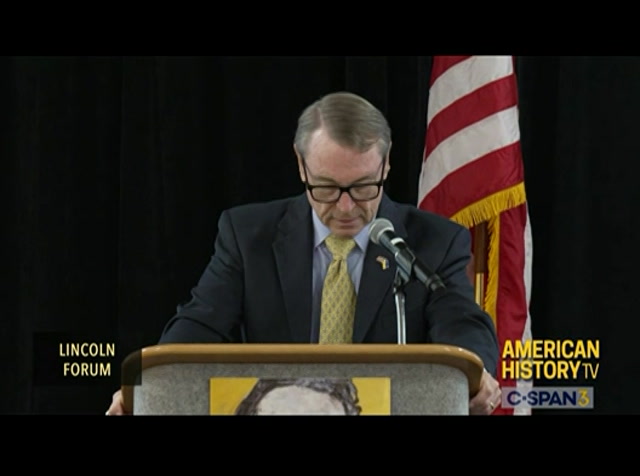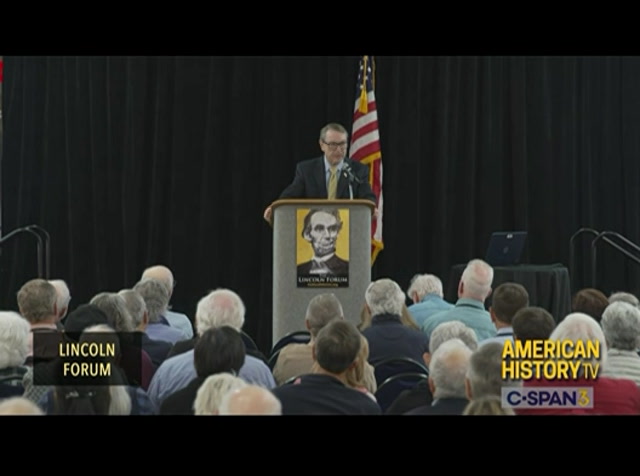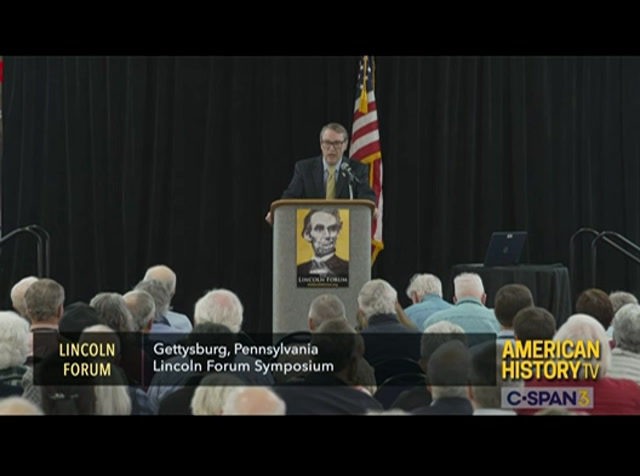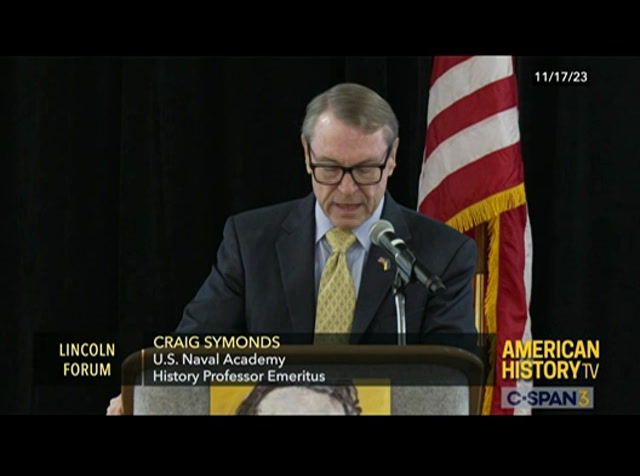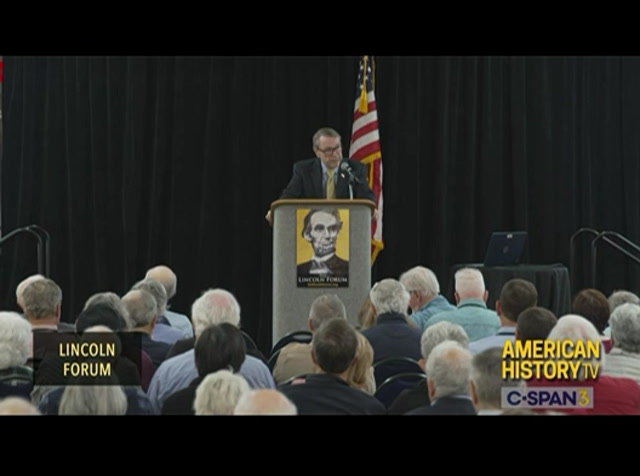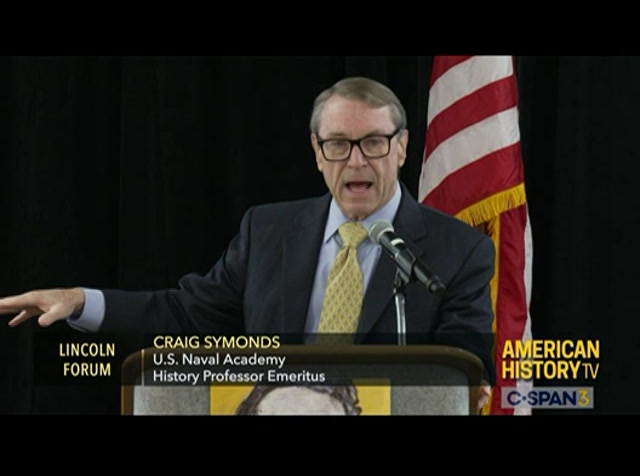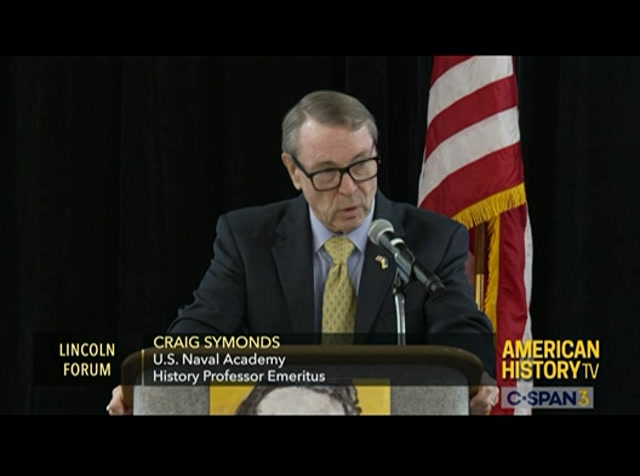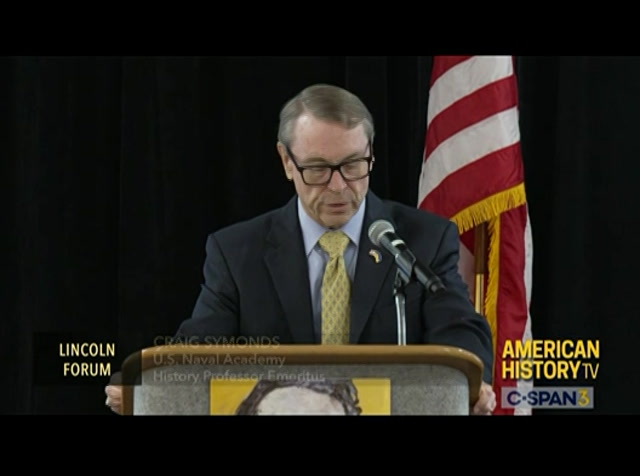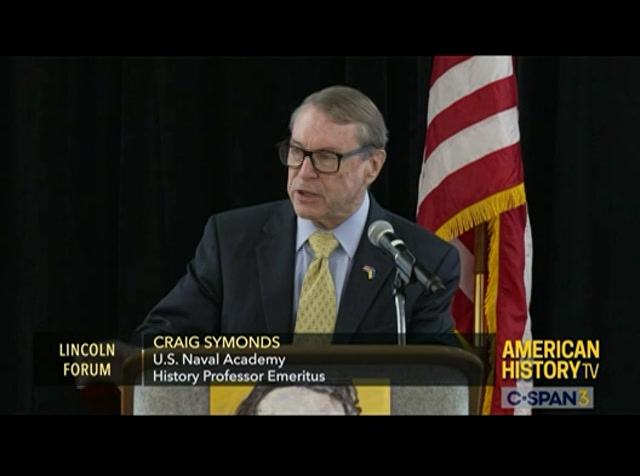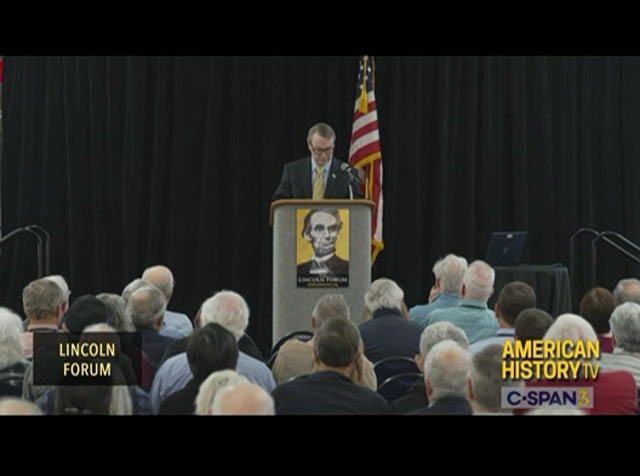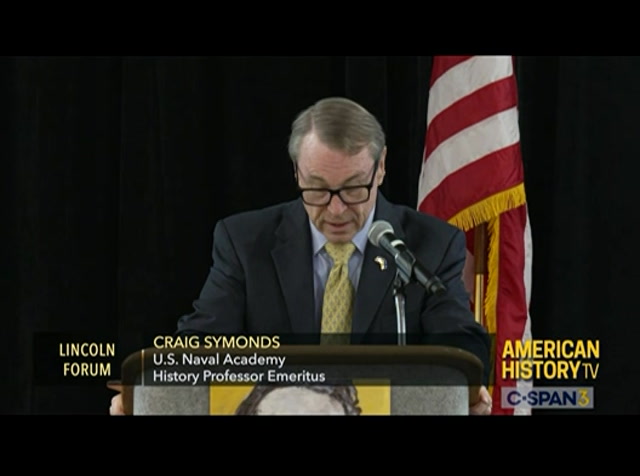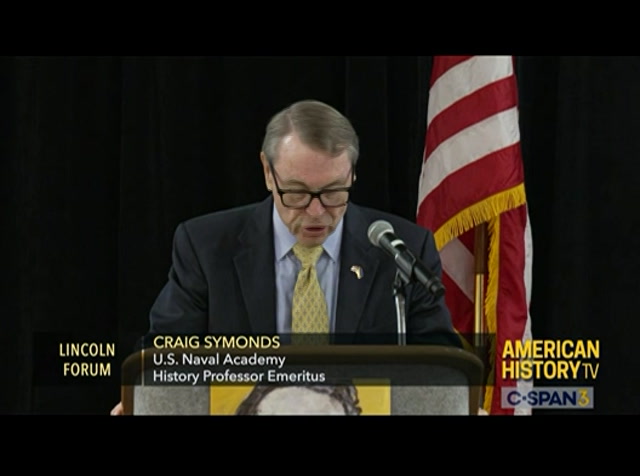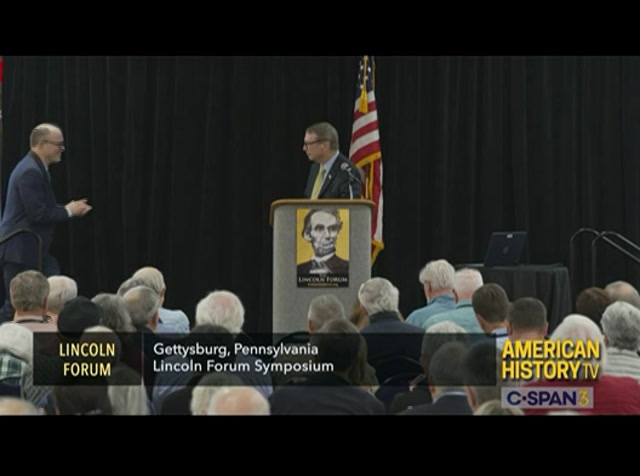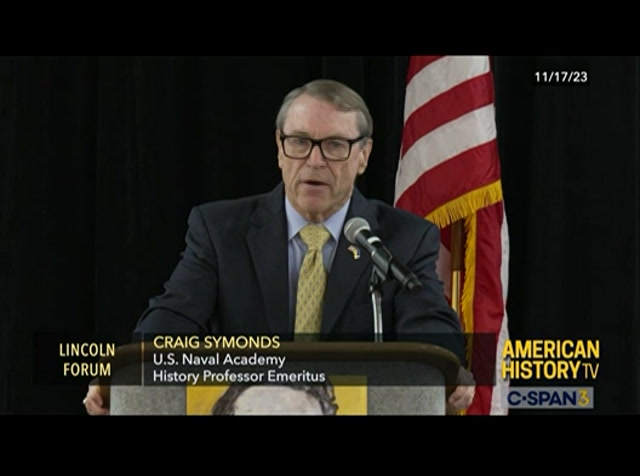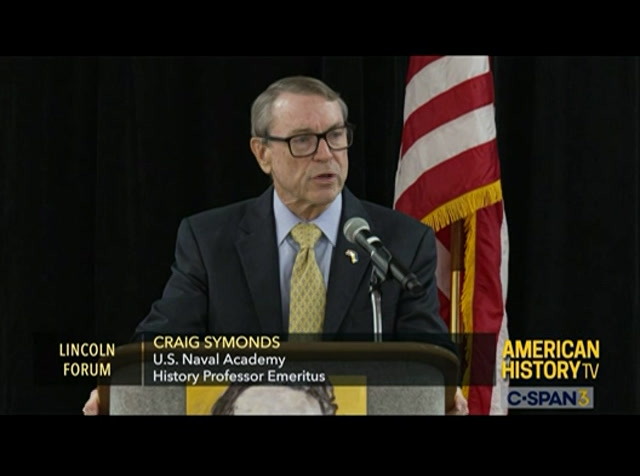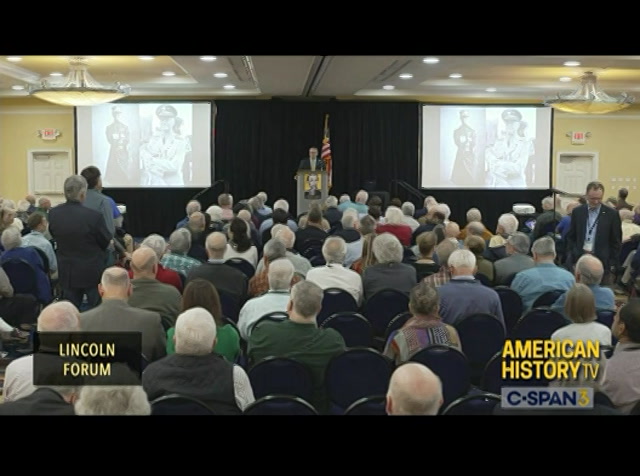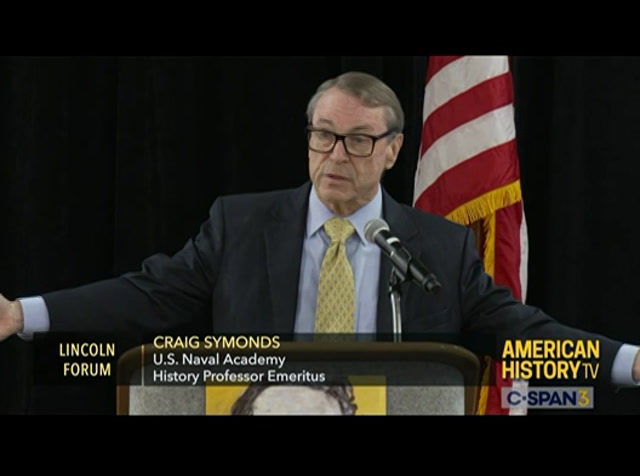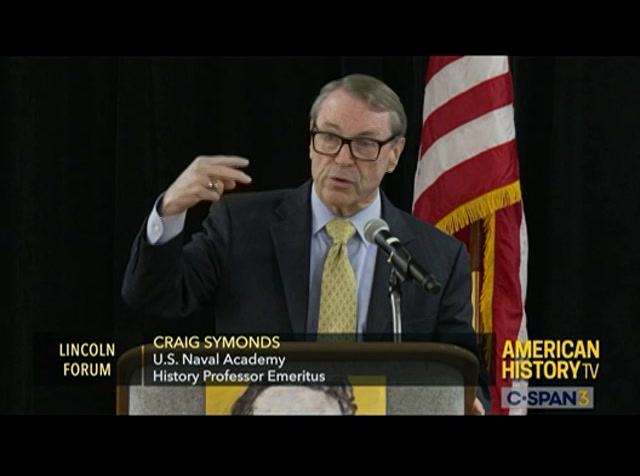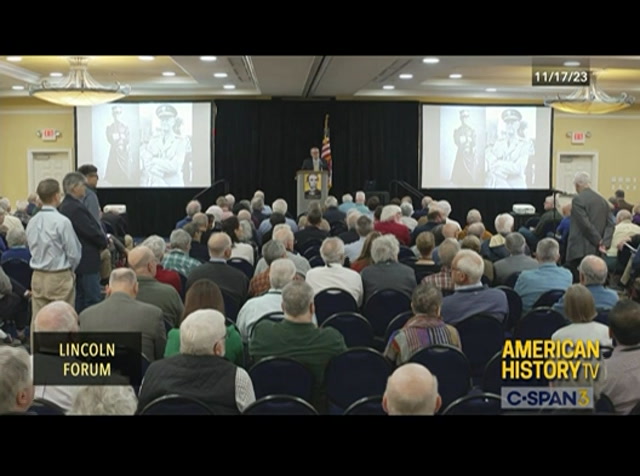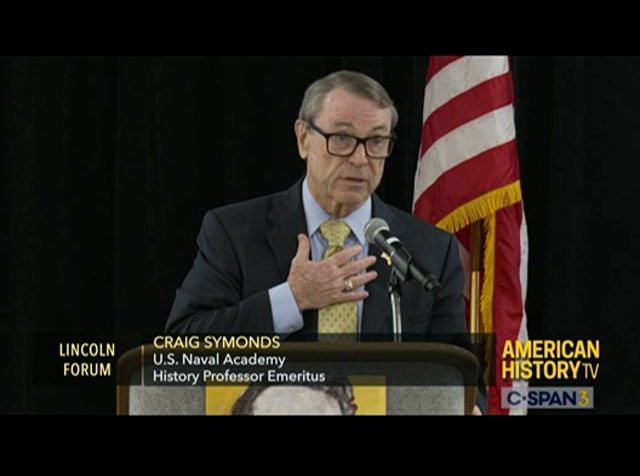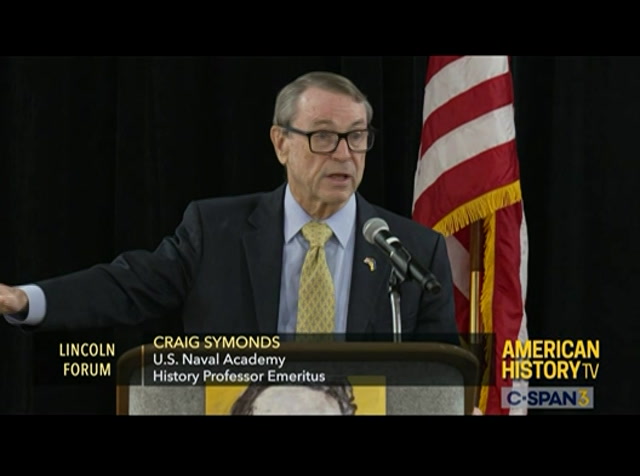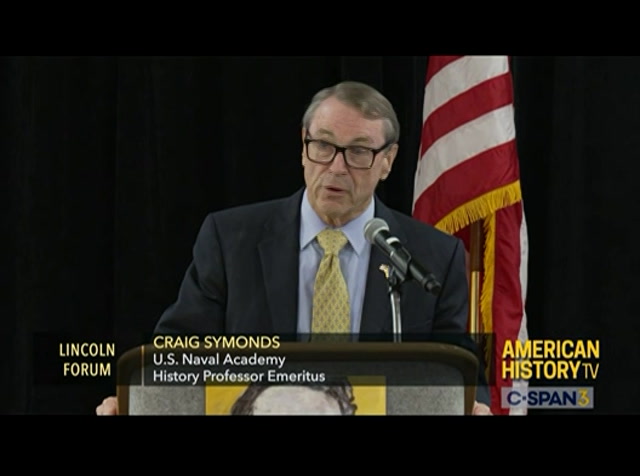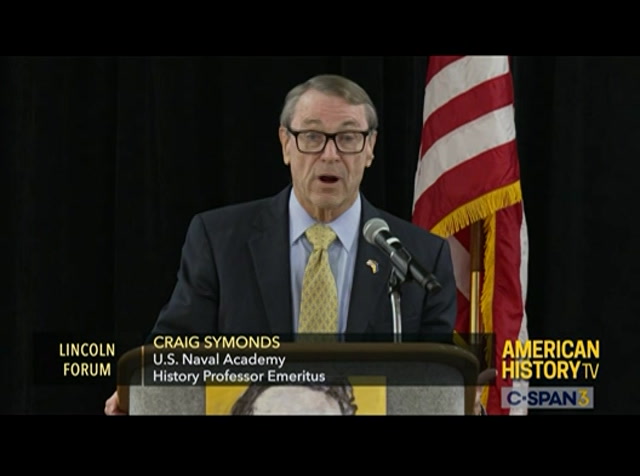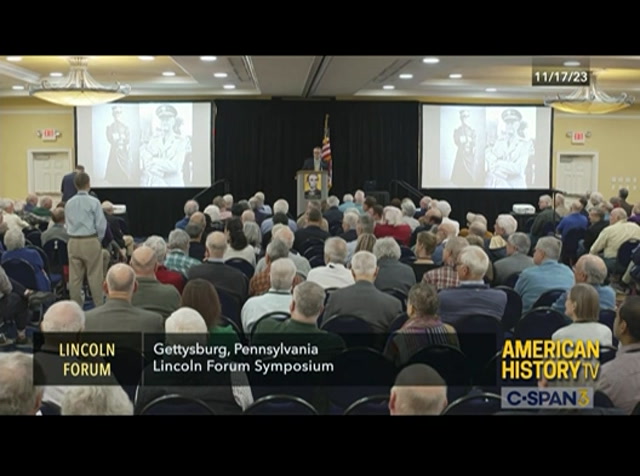tv The Civil War 2023 Lincoln Forum - Admirals Farragut and Nimitz CSPAN March 28, 2024 4:53pm-5:47pm EDT
4:53 pm
4:54 pm
my name is jonathan white and i am vice chair of the lincoln forum. it is distinct pleasure to introduce one of the lincoln forum's favorite from over the years. craig symonds. craig, an extraordinary scholar of naval and military history. he is the winner of the 2023 pritzker prize for military history, which, from what i understand, is one of the most lucrative prizes in all of historical writing. we might go to the bar later in the tab will be on craig. he also earned the samuel eliot morrison award for naval and in 2009 he won the gilder lehrman prize for lincoln and his admiral. after decades, the faculty at the u.s. naval academy, he served as the distinguished ernest j.
4:55 pm
king, visiting professor of maritime history at the u.s. naval war college. his book is nimitz at war. but before he turned his attention to war two, he wrote biographies of civil war generals patrick claiborne and. now harold holzer and i are always trying bring craig back into the 19th century. so morning he's going to join together his two areas of historical interest, the civil war and world war two. please join me in welcoming craig symonds. and your flight will come up in your. thank you very much. it's great to be here. what a great audience. what a great family. my wife and i always happy to come together as very good to be part of the lincoln forum. we heard this morning a wonderful presentation, character and leadership. and i want to build on that theme that ron white established
4:56 pm
so beautifully just a moments ago. and i will acknowledge what jonathan just said by telling you that harold has never forgiven me for moving from the civil war into the second world war. maybe some of are, too. but i try to keep my hand in, as jonathan mentioned, and the way of doing that. i'm going to talk about two to admirals who i think will help us understand and appreciate a bit more about character their leadership and in particular about temperament. the two admirals i'm going to examine are in the title of the paper, david glasgow farragut, the hero of new orleans and mobile bay and chester w nimitz, the supreme allied in the pacific ocean area in world war two. and i think, we've got a slide of the two of them side by here. what they are, they are in my
4:57 pm
classes at the naval academy. i often tell my students that studying leaders of the past will make them better leaders. i hope that's true to be perfectly frank. i'm not really sure that leadership something that can be taught in a classroom. i'm skeptical of leadership courses that attempt to list for you the seven habits of highly effective admirals or generals or business managers. but if we can learn how now i'm back. if we can learn about leadership, studying history. in depth and a lifetime is in my opinion the best way to do that? i do not think a minute that any of my students, when they confronted a situation in
4:58 pm
afghanistan in the med, the south china sea, ever said, ah ha, i know what to do here because what grant did in the wilderness or spruance at the battle of midway. that is not how it works. the ancient heraclitus once wrote that you never step in the same stream twice at the time. you step in at the time. am i back? this is just to keep you on your toes. we're doing it by the time you step in that stream. the second time the pebbles have shifted. different water is rushed past may be floating in the river it could be frozen still having crossed the stream once or watching someone else cross that stream. reading about how someone crossed stream can you for the kinds of problems you are likely to encounter when you cross it
4:59 pm
yourself. this is what mark twain meant, i believe, when he said doesn't repeat itself. but it does rhyme. a line that's being repeated more and more these days in either hope or fear. i'm not sure. so let's take a look at these two individuals and see if we discern some commonalities or perhaps some differences that help us explore pain, why they were effective successful leaders. by the way, this is pretty much my only slide. you'll have a long to get to look at these two guys. that is, of course, farragut on the left and nimitz on the. i love these two photos, by the way. note their grim express. nope. right away. they're just about to ram their head through with all. already there's one commonality and the similarity in body
5:00 pm
language. did you notice? did you notice that? did you notice at farragut has his arm over his left while nimitz his left arm over his right now why. my first thought was. huh? one of them's left handed. no, that's not it. i suspect the reason is that nimitz actually missing the ring finger on his left hand. a product of an encounter with a reduction gear in his earlier career. so he may be hiding it here inside his right elbow. more about nimitz later. but let me talk first about farragut. in many ways, farragut was a personification of 19th century america. in fact, we can pick off the particular aspects of his life and personal ality that allow to
5:01 pm
think about what are the touchstones of 19th century america. of all, farragut was the son of an immigrant and therefore a first to generation american. by the way, in the year he was born, which. 1801 35% of all americans were either immigrants or the children of immigrants. the figure today you're interested in such things is 24%. second, farragut was product of the western frontier. born in tennessee, only five years after tennessee, a state when it was still very much a frontier area. if fredric jackson turner is to be believed proximate to the western frontier is what made americans. third, farragut was essentially a self-made man. as we will see, which another
5:02 pm
supposedly american characteristic and he was a dedicated champion of the national union. as we will also see, given of that, he was pretty much a stereo type or at least an archetype of the 19th century american. his father, george farragut, immigrated to america from the island of minorca in the mandatory tinian. when minorca belonged to spain before british seized it in 1798. george arrived u.s. he married another immigrant. a woman from scotland, where the glasgow comes from, one particularly arresting about their son is that he started his naval career very young. my stuart academy were generally
5:03 pm
18 or 18 years old when they arrived in annapolis. had some as as 17 and a few who came to annapolis in their early. according to the statute you can be no older than 23 when you begin your studies at the naval academy, which means many of those who were in their twenties had prior enlisted service or had been to another college previously. i have a great story about that if anybody wants to follow up on it. and q&a. others come to annapolis after already completing several of college. i once had a student who was a first year student, which we call plebs at the naval academy, who already had a b.a. from yale in history. she got to be but most midshipmen today are between 18 and 22. so how old was farragut when he
5:04 pm
became a midshipman? anybody want to guess? 14. that's a good guess. i would have been not in the 19th century. he was nine. in the first half of the 19th century, there was no naval academy. west point had been founded in 1802, but annapolis was not established until a 45 large part because by 1845 it was obvious that with steam and more advanced ordnance, it was necessary to have some scientific base before you learned on the job. prior to that, naval officers got their training the old fashioned way. you went to see with a senior officer who took you on as a protege, you learn by doing. no port from starboard side or bow from stern. captains took them on as a
5:05 pm
project and they were called young gentlemen and they learned the ropes literally learned the ropes the old fashioned way. then they took a test. maybe 18, 19 years old. and if they passed the test, both written and oral, they became what was known as a passed midshipman eligible for promotion to lieutenant when there was an opening. so how did farragut become a midshipman. at nine? the story starts interestingly in new orleans where farragut of course would later earn immortal fame with his great victory. here's the story george farragut by then a widower with two children, was a employee in the navy yard at new orleans and one day when he was out fishing on the mississippi river, which he liked to do, a canoe drifted past him with apparently no one in it. upon investigation. george farragut found that there
5:06 pm
was an elderly man lying in the bottom of the canoe, unable to speak. no identificar, john farragut had no idea who he was, but he brought home, nursed him as he could until the man about two weeks later finally expired. and eventually, it turned out that he had been the 84 year old father of navy captain david porter, who commanded the gunboat squadron in new orleans at that time. when captain porter learned about george farragut generosity and kindness, he offered to repay his debt by taking one of his two sons as a midshipman. well, for a widower with two sons, this is quite a generous offer. midshipman appointments, then as now, are pretty rare and highly valued. so he gratefully accepted and
5:07 pm
off his nine year old son, james. wait a minute, james. i thought his name was david. well, there's a story there, too. as young farragut grew to manhood, living in the porter home on land and going to sea with captain farragut. whenever the captain went sea and serving as a midshipman, he decided to honor his benefactor honor by changing his first name from james to david. that got a little complicated. two years later, in 1813, when captain porter's wife gave birth to a son who was christened david. so now there's two of them. and because of that the second david is always by all three of his names. david dix and porter. both men became admirals, famous admirals in civil war for the
5:08 pm
next 40 years. david farragut, or including his mother's maiden name. david glasgow. farragut was promoted along with his peers or often ahead his peers. he was a particularly effective officer until he reached the rank of captain. then the highest rank available in the united states navy. there were no admirals prior to civil war in 1860. as everyone here knows, abraham lincoln was elected president, led to the secession crisis. and at that time, captain farragut was living in norfolk virginia not only because now as then, norfolk was a great navy town, but also because he had married norfolk woman. his first wife susan had died 20 years before in 1840, his second wife was, not only a virginian by birth and by residents, she was even named virginia.
5:09 pm
so here is a man born in tennessee raised in lewes, living in virginia, married to a southern whose family owned slaves. it was a moment reveals exactly who was when he learned in april of 1861 that the state of virginia voted to secede from the union after the clash at fort sumter and lincoln's call for volunteers was, farragut announced he, would not live in a disloyal state for one more hour. he went straight, told his wife his that he was leaving immediately. he gave her what amounted to an ultimatum, telling her this act of mine may cause years of separate action from your family. so you must decide quickly whether you will go with me or
5:10 pm
remain. he packed what he could carry in a valise and left norfolk for new york that day. she went with. you might want to compare this episode with robert e lee's action after. he learned of virginia's. and one of the more poignant passages douglas southall, freeman's biographer of lee freeman describes how lee underwent agonizing trial when he had to choose between his and his country. according to freeman, lee's up all night, pacing back and forth in his study wracked by doubt, unable to decide where his duty lay. supposedly his wife heard his footsteps back and forth across his study on the wooden floor until he came down in the morning to, tell her that he had
5:11 pm
decided resign his commission in the united states army and seek service with virginia freeman's chapter on this episode is called the decision he was born to make. well, farragut decision was the one he was born to make. but for him, there was no agonizing easing, no midnight pacing back and forth, no uncertainty. lee's american traced back several generations. farragut was the first of his family to be born in the united states. but from moment he heard of virginia disloyalty, he knew that he was an american first. the moment the state of virginia abandoned, the federal union. farragut abandoned the state. and yet, despite that there was some uncertainty in washington,
5:12 pm
d.c., about his loyalty and frankly, about his age. he was 60 years old, a spring chicken these days, especially in this room. but it was considered pretty long in the tooth in 1861. was that too old to be exercising command leadership? the union was planning an assault new orleans in the spring and both secretary of the navy gideon wells and assistant secretary gustavus fox wondered if farragut was up to the task. so decided to ask his younger foster brother david dixon porter. now david porter's reply to that request. interesting. starts out well enough. i see no reason why he should not be competent to do all that is expected of him. he wrote. okay, so far so good.
5:13 pm
then he added that while his foster brother was personally brave and likable enough he has no administrative qualities. he wants stability and loses much time in talking. at least he didn't say he drooled at the mouth mouth. it is possible and even likely that david dixon made those comments because he angling for the command himself. he didn't get it. slow male is sometimes today. it was slower then and by the time letter reached washington had already captured orleans. a century later. historian charles defour would publish a book about the fall of new orleans with the title the night the war was. if that is a slight exaggeration, it nevertheless
5:14 pm
acknowledges the huge strategic impact of farragut accomplishment. another characteristic of farragut is character. besides his boldness of action and political loyalty was that he was savvy. two years later, during lincoln's presidential election campaign in 1864, farragut was in new york city, where his the hartford was undergoing a refit. and while there, he attended a rally at the cooper union, which i think has heard of. but and according to the york herald, not our new york herald, but the newspaper new york herald. according to the new herald, when he was pointed out the audience, according to the paper the crowd rose to feet and broke out into one loud, hearty prolonged cheer, resplendent in his naval uniform. farragut bowed eyed and smiled.
5:15 pm
but when the organizers called upon him to make a speech, he replied, words that could not have been more welcome to abraham lincoln if he had written them himself. he said, i was invited here this not as a politician, but a naval officer to see the unanimity and the union feeling that here. but i must leave politics to you, my fellow citizens. i meddle not with politics, in the way speeches. i will endeavor my do my duty on the sea while you do yours. here. given the troubles that lincoln had with some of his ambitious cabinet members, with some of his recalcitrant generals, it was no doubt a relief for him to hear that one officer, at least stayed above the fray, utterly
5:16 pm
interrupted by the adulation of the crowd or the fruits political office. later, of course, did indeed do his duty the sea, when he charged into mobile bay, alabama. you all know the story. the hartford now completely refitted. new york was halfway through the channel the bay when there was muffled underwater thump, and the ship immediately to his right, the iron clad come, sir, rose up out of the sea. its pointing downward, its stern came and it shot down like an arrow and disappeared from the sea, taking most of its crew down with it sunk by a mine or what was then called a torpedo. when that hap the ship directly in front of farragut, the brooklyn stop, and then started to back. well, the ships are all in a.
5:17 pm
that of course is when farragut took matters in hand in order to avoid having his entire column of ships collapse like an accordion directly under the guns fort morgan. he ordered hartford to veer out of line and steam the brooklyn right. the marked minefield. and as he passed her captain called across to tell him that there were torpedoes in the water dead ahead to farragut replied. oh god. here's the thing to remember about that remarkable episode. this was not an act of unthinking bravado, a kind of, forlorn charge like the brigade, or for matter picket at gettysburg. here it was a practical response to a swiftly unraveling situation. it was also absolutely the right
5:18 pm
decision. any decision would have led to chaos at a critical moment. once through the minefield without casualties. by the way, farragut squadron easily defeated the rebel squadron inside mobile bay and seized command of the bay, which cut off the city along with sherman's of atlanta, farragut capture of mobile bay helped. secure lincoln's reelection. arguably the most strategically decisive event the entire war. so it is easy for me to hold up farragut to midshipman as an example of good leadership for his faithfulness to his mentor his instructive and unblinking to his country, for his quick decision making in a crisis. so what about guy?
5:19 pm
i wanted to include in this conversation. i think he fits the point. i'm trying to make about and decision making, but also to be honest, because i recently wrote a book him and he's been on my mind. nimitz to interestingly is the son of in this case german who settled in the hill country of, north texas, near where lbj grew up, the town where he is born was born fredericks burg. texas was named for prince frederick of germany, has a german flavor to it. if you visit the restaurants along street are mostly german restaurants and boy the beer is amazing. not that i would know that firsthand. and there's also a museum there. the national museum of the pacific war. and if you wonder why the museum of the pacific war is in fredericksburg texas, it's
5:20 pm
because chester nimitz was born there there also like nimitz was raised a surrogate parent. his father died of heart attack at age 29, four months before chester nimitz was born. so he was raised by his mother and his paternal who taught him, among other things, not to about that were beyond his control. a calm deliberative pace. grandpa nimitz told him, was more valuable than frenzied activity. nimitz, however, not go to see it. nine. by then, united states naval academy had come into and young boys did not go to see as midshipmen. they went to school. in fact, chester nimitz no plans to go to sea at all. a turning point in his occurred
5:21 pm
when he was watching an article three demonstration at a county that was supervised by a group of west point cadets in their resplendent uniform of the tall shako as they looked plastic. young chester was impressed by them and asked them about this called west point. whatever they said, convinced him, that's what he wanted. so he contacted his to ask about west point, to be told that all the appointments for that year had been filled. had he thought about the naval academy? there's a naval academy, nimitz never heard of it, but it sounded okay. and so after passing the admissions test, he went off to annapolis in 1901 at the age 17. now, nimitz never had to choose between state and his country as farragut did. but there's an interesting story about his loyalties that i'll
5:22 pm
here after he left for annapolis from texas, aunts and uncles worried that he would come back contaminated by yankee influences. so of course many of them were horrified. he returned five years later with a young wife in tow. the beautiful 20 year old catherine vance freeman, who was from brooklyn. you can't get much yankee than that unless maybe you're from boston then. during that visit back to texas some of chester's relatives wanted to make. sure. young catherine knew what was what here in texas. so as members of the family sat around in the parlor. one of them pointedly asked, chester, what he would do if texas again seceded from the union. would he fight for texas or for federal government in washington? catherine remembered later that the woman asking the question
5:23 pm
look directly at her as she asked it. now you'll see what's what. yankee girl. chester smiled graciously and answered quietly, as was his want. why, of course, i would fight for the states against any rebellion. catherine remembered later that the woman nearly dropped her teacup. now, if. if this is not quite the same as deciding to leave home on an hour's notice and it's hypothetical. in any case, chester had made loyalty clear. one central aspect of chester nimitz life and his command, too, was his calm and deliberative manner influenced by his grandfather. no doubt. he smiled readily. but it was always a tight lipped smile. the one you see here. to some, it implied skepticism. maybe a cautious reserve.
5:24 pm
in fact. it was because chester was embarrassed by his teeth. he had never seen a dentist in the hill country, texas, until he showed up in annapolis in a 1940, on the verge of being promoted to the highest command authority in the pacific war. his medical indicates he's missing. 14 teeth. all the rest of, which were, in fact, gold. so he mostly his mouth tightly shut. i challenge you to find a photograph of him. showing his teeth. i have not been able to do so. like farragut nimitz could make bold decisions every bit as bold as farragut dash into mobile bay. most famous, perhaps, came june of 1942, when four warned of a japanese approached midway atoll. he decided to confront the enemy, even though on paper he was badly overmatched, aware that his strategic mission,
5:25 pm
according to the overall strategic plan of the allies, was to on the defensive in the pacific until germany defeated. he might have let the japanese midway. after all, they would have a very difficult sustaining it 3000 miles from japan with no domestic source of fuel or food, water, for that matter. arguable, that would have been the smart move. instead, nimitz decided to send everything he had, all the ships, all the planes out to meet the threat like frigates at mobile bay. it was not audacity. he was not brash, impetuous. he assessed the circumstances, what he called calculated risk to make his decision. the japanese had more carriers, but he had an airstrip midway itself. the japanese had more
5:26 pm
battleships. but thanks to codebreakers, he knew they were coming. and when he believed, he could win. and of course he did. here's another example that's less well known. a year and a half later, after midway in the aftermath of the costly american victory of tarawa, where a marines had been killed and, 3000 wounded in conquering an less than a half square mile in size. there was a lot of worried, second guessing about the next step to invade the bigger and frankly much stronger island of kwajalein. all three of nimitz's subordinates advised against it. fleet commander raymond spruance, the amphibious commander richmond, kelly turner and commander of the marines who would make the assault. holland howling mad smith insisted that kwajalein was
5:27 pm
ambitious. it would be wiser argued to attack two smaller outer islands, first and take on quadrillion some future date. nimitz explained his rationale to them capturing the outer islands would not break japanese power. the marshall's, he explained, and kwajalein would have to be taken eventually anyway. but if quadrillion fell all those outer islands would by default. besides, he believed that the bloodbath at tarawa had taught lessons that he could apply. then to the conquest of kwajalein. they were not convinced, always willing to hear. here's another characteristic of nimitz's leadership. he invited them to state their views. and they went around the table every person there said, no, no, we should not attack yelling. we should attack the islands. nimitz waited until everyone spoken. then he was quiet for a long,
5:28 pm
pregnant pause to make sure no else had anything to say. and he said, well, that's fine. well, attack quadrillion quadrillion. now that should have ended it. but spruance and turner continued to argue with them the volatile kelly turner even called nimitz's plan dangerous and reckless. and finally nimitz said to them look, this is it if you don't want to do it, i find people who will. ah, you willing to make this attack or not? well. okay. i guess that's saying that's fine. we'll take quadrillion. like some of the drama of -- the torpedoes. but it's the same sentiment. and like farragut decision at mobile bay, it was carefully calculus lighted. nimitz was convinced japanese did not intend to go all in to defend coagulant. they would not commit the fleet. and he was equally confident
5:29 pm
that the adjustments he made to the assault would compensate for the losses that had happened at tarawa. still he risked a great deal here in going ahead with an operation against the unanimous opposition of all his operational commanders. if the attack had failed or even if it had succeed with serious losses, he very likely would have lost his job as midway. he carefully calculated the risks. ordered the attack. it went off like clockwork. the americans lost 300. killed the japanese lost 8000 killed. afterward, the japanese retreated 1200 miles to the west. it was the beginning of the end for them. they knew it. here's another aspect of nimitz's command temperament. i feel compelled to mention, and i say this for lost on purpose, he had a sense of humor. he didn't tell jokes.
5:30 pm
the fellow officer said he, told stories that had a humorous side. and i really wanted to tell to this audience, too, because we know somebody else who had a tendency to do that. one confronted with an obstreperous or an argument in progress lincoln might say, that reminds me of a story. and nimitz did exactly the same thing. one of his favorites was about a young doctor who arrived at the home of a nervous father to be. don't worry, don't worry. the doctor told him everything will be fine and he disappeared into the room with the expectant mother. but after a minute he came and asked the father for a butter knife. then went back in, which would be provided. and then he went back into the room. a minute passes and by way, this is the way nimitz told a story. a minute passes. and he would pause like this. and then doctor came back out to
5:31 pm
ask for a screwdriver. then it was a pair of pliers, then a stiff wire with a hook on the end. now, depending on the audience, buildup would go on for several minutes until finally they lost patience. and nimitz would deliver the punch line. father would say, doctor, doctor, is everything all right? and he said, oh, yes, just fine. i can't get my bag open. now. you can see telling that story right? some nimitz's stories were risque. what passes for risque in 1942? catherine sometimes stopped him when he began one of these in mixed company, but they were a staple at the officer's table out in hawaii when he was in command. if his guests moved from the dinner table, the card table,
5:32 pm
which was not unusual, nimitz might tell the story of the aspiring bridge player who was invited to a party at the home of the local bridge champion. alas her husband, who was partnered with the hostess, played terribly forgetting what was trump. trump against partners ace. he was awful. his bidding made no sense when he excused himself then to go to the bathroom, his humiliated wife apologized for him and the graciously waved her off, although she did say this is the first time all evening i have been pretty sure of what he was holding his hand. it might be possible to make a list of characteristics shared by these two men. for a leadership manual. here we go. nimitz's chief of staff raymond spruance essentially did that.
5:33 pm
he wrote his wife, margaret, about his and here's what he said. admiral nimitz wrote her is a marvelous combat of tolerance, of the opinions of others. wise judgment after. he listened and determined to carry things through tolerance judgment, determination. spruance knew what he was talking about. and we can see all three of these characteristics. both of these men. they could and did tolerate the views of others. indeed, they out of their way to salute at different ideas, to listen to them carefully and to take their ideas seriously. in evaluating those ideas, calculated all sorts of factors. plans, of course, and the circumstances who was involved. the likely outcome and even if they had to make quick decision. they did not rash decisions.
5:34 pm
after calculating the odds, they applied a firm and quiet judgment. and once the decision was made, they demonstrated a powerful determination to carry it through, not to change course in midstream. because as we all know, you never step in the same stream twice. thank you. and good. we we've about 12 minutes for question. so again, please come to the microphones so that the audience on c-span can hear your question. thanks, james. candy. hi. how are you? i'm great. good. i'm candy hooper and author here.
5:35 pm
and great fan of craig's. and i wondered whether you might enlarge on the theme of loyalty here. one time i saw on c-span you talking about the difference navy, naval officers and. army officers, in terms of taking sides in the civil war. yeah. thank you. that's a thank you. that's a great question. i have argued elsewhere and i think it's mostly true. in fact, that army officer in the 19th century, we are often associated with their communities. regiment you remember even in the civil war were named for their states 24th you know maine, the 20th, massachusetts or whatever. whereas officers had a tendency to represent the entire nation abroad to foreign countries, to third world countries representing the countries interests overseas and that create the dynamic in which army might be more to think about
5:36 pm
loyalty to their unit, their state, their. whereas naval officers might be more inclined to think about their responsibility to the nation as a whole. i'm not sure that's what influenced farragut here. it may be he did serve overseas a junior officer in the caribbean and elsewhere representing united states, and that could have had an impact on him. but i really believe that instead it his second generation americanness and which he was grateful to the country that took in his father and mother, for that matter, and where he was born, that led him to make the decision that he was born to make still. i think that's a good point to keep in mind. i could make fun of my army friends here i. i will restrain. yes, sir. good morning. thank you. i was just if nimitz had ever met yamamoto or what he thought of yamamoto. oh.
5:37 pm
to my knowledge nimitz did not meet yamamoto. there was moment when the american ambassador to the united states and while he was in the united states, was carried to japan on an american cruiser and the midshipman, which nimitz was at the time paraded and gave the sorge salute and all that. to my knowledge that's the only time he ever actually had any connection with or relation to japanese leaders. both men were command of for their time. huge operations, especially nimitz had a fleet of thousands of vessels. if you include landing craft, everything. my question is, how did they communicate with these vast operations? not specifics of operations, but the spirit, the maybe the ideology of what we're fighting for? how did their men come to appreciate them? how did they become certain loyalties? a two way street?
5:38 pm
how did they build their? you make a very good point about the fact that farragut was a kind of a hands on as large as the navy became in the civil war up to 680 ships. by the time the war was over. by and large, the commander of a or a squadron knew, all of the commanders who worked for him knew them personally, would meet with them, period. particularly if you are a blockade duty off the coast where there's not a whole lot else to do, you would bring all the captains together and you would have conversations around, the table and presumably those conversations extended themselves to the ward rooms of the other ships in the fleet or the squadron. nimitz's circumstance were clearly very different. he commanded fleets that would dwarf anything that existed in the 19th century from any country, including great britain, including the union navy in the civil war. he did try very hard. he set aside the 11:00 to 12:00 hour every morning in hawaii, every ship that touched port in harbor. the commanding officer was told to report to the commanding
5:39 pm
officers office at 11:00 and you would sit down a conversation and afterward. we know from his aide who kept notes at these meetings would say, keep an eye on that one. he's one of the good ones or, you know, we've got to keep an eye on him for different. so he was to keep track but they are there were, as you mentioned, thousands them. so nimitz a protocol of explaining as clearly as he could to the operational commander what the objective was, what forces he had available to achieve it, and how much information he had about difficulty was he was like doing and then sent him off. he did not try to micromanage from a he did not tell spruance or halsey or anybody else. here's what ought to do here. he said i've given you all i can. i support you as much as i can. i'm now relying on you to do what you need to do. so the communication link between the top and the bottom.
5:40 pm
that command pyramid was different in a smaller navy in the 19th century than it became the enormous navy in the 20th century. but that's an important point. thank, sir. yeah. hi. i have visited fredericksburg. so. but i have a question for you. number one, from what i learned there, he was heavily pressured by his family to go into the family business, which was the hotel business. of course, you know. and how much did that affect him? but i another question on a more personal level is standing in that huge courtyard in the middle of that museum and seeing all those names and realizing that he said anybody, no matter. what their rank that served with them should have their name there. i found that very moving. yeah. nimitz was i think nimitz genuinely carried it wasn't just a pr or self-promotional notion. he really felt they were all on a team. and the best example of that is
5:41 pm
probably not even at fredericksburg, which is moving enough. but if you visit the san bruno cemetery near francisco, in fact, quite san francisco airport, nimitz, they had a place save for him. arlington national cemetery. they were going to put up a monument and been no, no, no, i want to be buried with the men i served with. and when his subordinates found out about this, spruance and turner and others, charlie lockwood, who commanded the submarines, they all said, me too. me too. so if you visit that cemetery. it is it's very moving to begin with because there's this sea of stones, you know, the little beehive shaped stones that extend almost as far the eye can see. his is in there, it's exactly identical as. everybody else but around him are spruance and lockwood and turner and the others who all went in on that. and i think that demonstrates his sense of camaraderie and team's mateship, if that's even
5:42 pm
a word, i think he took it very seriously. one more point i'll add to that. he he would get letters, particularly after, by the way, from mothers, sweethearts, usually mothers who would say things like killed my son at tarawa and and how do you deal with that. you know he would for first year he answered each of those personally and then they began to pile up into the thousands. and he couldn't do it. and his aide, hal lamarr, would stop showing them to him. he wouldn't send them into the office. he'd on in his name but wouldn't show them because nimitz would take it very seriously and be very quiet for a while afterward. so you for that? yes, sir. hi, i'm jeff mathews, first time attendee. excellent. hey, welcome, jeff. thanks for coming. come back. excellent. and i wondered if, you can't teach leadership. were you as a professor able to see in your students midshipmen
5:43 pm
those qualities that later demonstrated maybe during the course of their careers? i hope so. i taught there for 30 years. i began teaching 1976. and of course, the students i taught in the late seventies and early eighties, you know, albeit not all became but obviously more vanced an age now and many became admirals and leaders and congressmen and and so forth. i'll tell one quick story on myself and that that i was working at my desk at home day and the phone rang and he said, professor, you won't remember me. i was in your civil war class many years ago, and i just read one of your books and reminded me about what a great time i had in your class and how much i learned from you about leadership and so on. and i that was meaningful. me it happens now and again. never often enough, but but i always, well, that's great, you know. and what are you doing these days? and there was a short pause and he said, i'm governor of missouri.
5:44 pm
yes, professor, thank you for being so brilliant this. morning. i wondered i'm curious about the anecdote about farragut. you invited us to ask you about the q&a. oh, yeah, actually it's not so much about farragut as it is about the fact that midshipmen come to the naval academy now, particularly they're 21, 22 years old, having had prior experiences to their arrival the way the naval academy is set up the rising what we call junior second classmen a take the plebes in hand and marched them around how to wear the uniform to stand, how to salute, where to march, who to talk. and so during please summer which kind of like a boot camp, the upperclassmen who are 19 years old themselves, mostly are kind of yelling at these people, you know, set straight men to look me in the eye. and what's the name of? so this is going on for several
5:45 pm
weeks. and then there was a scheduled uniform inspection where they were supposed to have had to wear their full dress uniform with all the proper accouterment. so they're all lined up in this 19 year old comes out to yell at this fellow and stops, got four rows of ribbons. three purple hearts. he says, you're fine. yes, sir. you you nicely illustrated a number of commonalities between. farragut and nimitz. and it made me wonder, are you aware of certain naval leaders, the nimitz in particular admired or himself after and would farragut be on that list. yeah. and not people you would have heard of. he admiral robinson, who was head of submarine service in world war one and for whom nimitz served as a officer, was a particular hero. his and i think it's not because
5:46 pm
they did a heroic things they led a charge, made a critical decision. but because they demonstrated this of restrained thoughtfulness and inclusiveness, that that nimitz himself embraced later in his command tenure. so he did have people that he admired. but it's it's not that he admired, you know, pershing or somebody who was who was famous and in the headlines, admired people who got the job done, which was what often tried to do as well. so jonathan, thank you.
6 Views
IN COLLECTIONS
CSPAN3 Television Archive
Television Archive  Television Archive News Search Service
Television Archive News Search Service 
Uploaded by TV Archive on

 Live Music Archive
Live Music Archive Librivox Free Audio
Librivox Free Audio Metropolitan Museum
Metropolitan Museum Cleveland Museum of Art
Cleveland Museum of Art Internet Arcade
Internet Arcade Console Living Room
Console Living Room Books to Borrow
Books to Borrow Open Library
Open Library TV News
TV News Understanding 9/11
Understanding 9/11